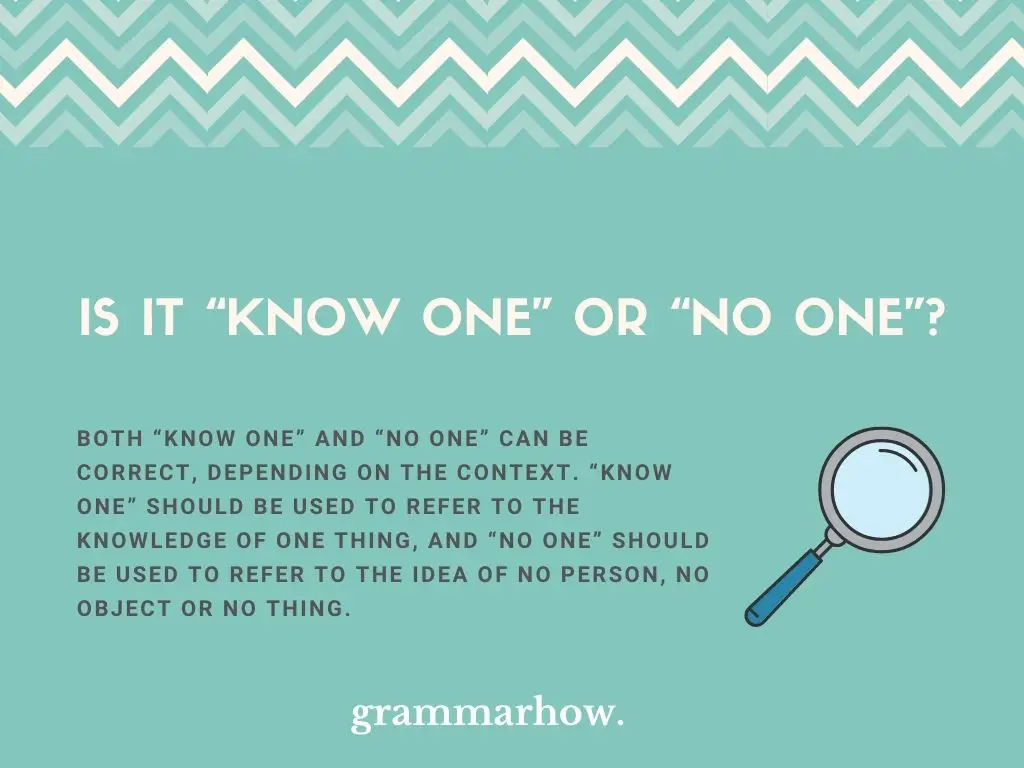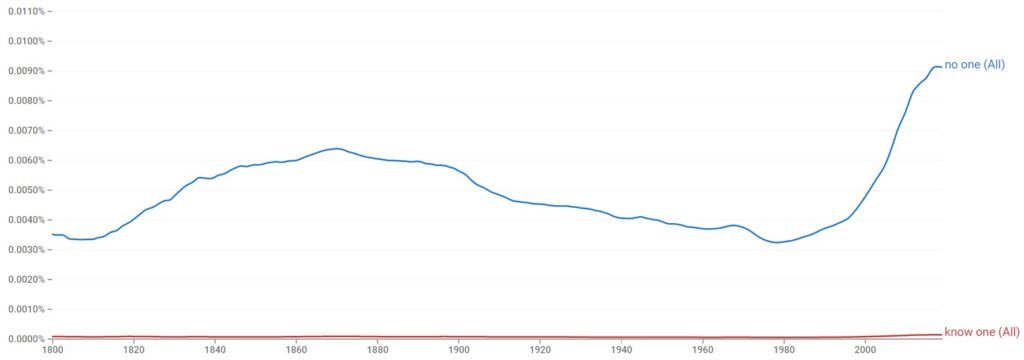The following article will explain the differences between saying “Know one” and “No one”, and in what contexts should a person use either. Using examples to clarify, this article will answer all your questions about “Know one” and “No one”.
Is It “Know One” Or “No One”?
Both “Know one” and “No one” can be correct, depending on the context. “Know one” should be used to refer to the knowledge of one thing, and “No one” should be used to refer to the idea of no person, no object or no thing.

“Know one” and “No one” are phonetically equivalent expressions, but not only are they spelled differently, they also mean different things. This is why it can sometimes be easy to confuse them.
Both are correct if used in their proper contexts, it’s simply a matter of properly analyzing the sentence and analyzing whether it makes sense to use “Know one” or “No one”.
What Does “Know One” Mean?
“Know one” is a phrase that means that you have the knowledge of the existence of one, singular person, object, or thing. It should be used when referring to that singular knowledge.
The phrase “Know one” can be used in any context where your knowledge of this object, and the fact that it is singular, is relevant.
Here are some example sentences to help you understand the use of “Know one”:
- They say that it takes one to know one.
- I only know one person who can help us with this problem.
- They know one thing about us, and that thing is our strength.
- Thinking about all of his poems, I realized that I already know one.
- I know one of the members of that organization, they can help.
- He knows one thing about the scientific field that we study.
- I had not realized that I know one of the people involved in the play.
- She knows one thing about exploration, and it’s the most important thing.
- To know one thing is to fully understand that one thing.
- If you know one romantic comedy, you know all of them.
What Does “No One” Mean?
“No one” is a pronoun that means “No person”, “No human”, and implies a lack of presence. It should be used when the absence of people is, in some way, notable for the situation.
“No one else” exists as a specific variation of “No one”, and it means “No other person”, in a context in which you’re talking about the person who fits the bill no one else does.
These example sentences will clarify the ways in which one should use “No one”:
- No one thinks that his attempt at the price was successful.
- There is no one else in the world for me, other than you.
- They released a new entry in 2017 but no one saw it.
- I think no one has yet realized that the entry is bugged.
- Years ago they passed a law that destroyed politics, and no one noticed.
- No one is as qualified for this job as she is, I’m sure of it.
- No one released a better entertainment product than that in 2021.
- There is no one else who can help us with this problem.
- No one out there understands what you’re going through, except for me.
- No one has seen the exhibition yet.
Are “Know One” And “No One” Interchangeable?
No, they are not interchangeable at all. “Know one” and “No one” refer to completely different things and should never be exchanged with each other in a sentence, because their meanings are too different.
“Know one” refers to singular knowledge of one person, object, or thing. “No one” is a pronoun that you use when talking about no person, object, or thing.
Their use in context is too different for them to be exchanged in any way or form, and they share no relation beyond being phonetically equivalent.
Is “Know One” Or “No One” Used The Most?
According to data provided by the Google Ngram Viewer, “No one” is by far used more than “Know one”, and has been since the 1800s at least.

We can gather that the use of “No one” has fluctuated over the years, with a peak in 1869, followed by a valley in 1979, then a peak in 2017.
However, in spite of all of these fluctuations, “No one” has consistently remained far more in use than “Know one”, which by contrast remains a niche expression.
It’s worth noting, though, that “Know one” has remained consistently low in use over the years, and has recently, since 2017, picked up slightly more use than ever before in its history.
“Know One” – Synonyms
- To understand one
- To experience one
- To notice one
- To recognize one
- To appreciate one
“No One” – Synonyms
- Nobody
- Not anyone
- Not one
- Nothing
- None
You may also like: “No One Know” or “No One Knows” – Correct Version (Examples)

Martin holds a Master’s degree in Finance and International Business. He has six years of experience in professional communication with clients, executives, and colleagues. Furthermore, he has teaching experience from Aarhus University. Martin has been featured as an expert in communication and teaching on Forbes and Shopify. Read more about Martin here.
